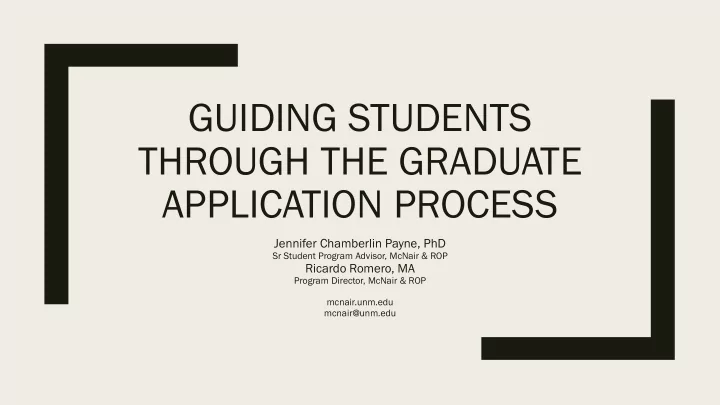

GUIDING STUDENTS THROUGH THE GRADUATE APPLICATION PROCESS Jennifer Chamberlin Payne, PhD Sr Student Program Advisor, McNair & ROP Ricardo Romero, MA Program Director, McNair & ROP mcnair.unm.edu mcnair@unm.edu
Topics ■ Differences between Masters and PhD programs ■ Gaining research experience as an undergraduate ■ How to secure GOOD letters of recommendation ■ How to choose the RIGHT graduate program ■ GRE ■ Tackling admissions essays
Masters vs PhD programs ■ Advantages of a Masters program – Shorter time to finish – Sometimes lower admissions standards – Sufficient to practice as a professional in certain fields (e.g., Business, Engineering, Architecture, Counseling, Speech Language Pathology) ■ Advantages of a PhD program – Funding!!! – Potential for more career options – More autonomy to pursue your particular research interest – Sometimes less competition to gain admission – Can leave program with a Masters
Gaining research experience ■ Introduction to what they will be doing in graduate school ■ Ideally done with a tenure-track professor ■ Impressive on a grad application for most majors, necessary for other majors (e.g., Psychology, Biology, Physics) ■ Encourage to look beyond your campus to…
REUs (Research Experience for Undergraduates) and SROPs (Summer Research Opportunity Programs) ■ Approximately 8-10 weeks during a summer – Paid travel – Room & board included – Stipend ■ Often underrepresented groups are prioritized ■ Applications due early Spring semester and typically require – Transcripts – Letters of recommendation – Essays – At least one semester left in undergrad
REUs (Research Experience for Undergraduates) and SROPs (Summer Research Opportunity Programs) ■ Many opportunities nationwide for high-achieving, motivated students ■ NSF: https://www.nsf.gov/crssprgm/reu/reu_search.jsp ■ Pathways to Science: http://www.pathwaystoscience.org/programs.aspx?descriptorhub=SummerResearc h_Summer%20Research%20Opportunity ■ Big Ten Academic Alliance: https://www.btaa.org/students/srop/introduction ■ Summer Research Academy at UCF: https://our.ucf.edu/prospective/sra/
Securing letters of recommendation ■ Preferably from tenure-track faculty, but default to people who will write strong letters ■ Start forming the relationships early with faculty ■ Guides for requesting letters – https://mcnairsite.files.wordpress.com/2013/09/requesting-a-letter-of-reference- guide.pdf ■ No groveling
Choosing the School ■ US News and World Report provides rankings – Useful as an organizational tool, but rankings are inaccurate and biased ■ Research and career match are most critical ■ Consulting professors ■ Backtrack the articles and books they enjoyed ■ DON’T choose school for the wrong reasons (prestige, location, etc.) ■ Create a “Grad Application Matrix"
Graduate Record Examination (GRE) ■ Scores are important, but not life or death; applications are reviewed holistically in most programs ■ Important to practice taking the test in computer format ■ Inexpensive study prep – Magoosh (fully online course modules) – Kaplan, Princeton Review (books/online, not programs) ■ Some REUs and SROPs have GRE prep
Financial Aid ■ FAFSA not required for all programs but should be filled out ■ No Pell or other federal assistance in grad school ■ Fellowships and Assistantships pay most costs ■ Should NOT take out loans if at all possible
Admissions Essays ■ Many names, common purpose: Personal Statement, Statement of Purpose, Letter of Intent, Research Statement, Diversity Statement ■ Expect to write many drafts, up to 20! ■ Less is more (1pg. single spaced) ■ Should be reviewed by no more than 3-4 people. – Consider using the following order ■ First reviewer to check for grammar and writing mechanics ■ Second reviewer to edit for content and clarity ■ Third reviewer (professor or grad student) to help with finishing touches
Admissions Essays (cont.) ■ FOLLOW PROMPTS AND WORD LIMITS! ■ But if there are no prompts or word limits, use the following guide ■ 3 main components of admissions essays: – Background – Qualifications – Fit to program
Background ■ Describe what specific events and experiences in your life have motivated you to pursue graduate study in your chosen field – Avoid clichés – Avoid sob stories unless relevant to your future studies – Can discuss your personal background, if relevant – Who inspired you? (teachers, professors, family) – Clearly state the program to which you are applying
Qualifications ■ Why are you qualified for advanced scholarship? – Research experience ■ Research publications and presentations – Advanced coursework – Relevant job or volunteer experience – Certifications, languages, special skills or competencies – Omit irrelevant info
Fit to Program ■ Don ’ t underestimate the importance of fit to program! – No matter how smart and prepared the applicant, one must be a good fit for that particular program or no admission ■ Match applicant’s interests to faculty research topics ■ Demonstrate knowledge of the program, university, resources, etc. ■ Make clear why applicant fits in that program
McNair Scholars Program & Research Opportunity Program ■ Ricardo Romero, Program Director, loborr@unm.edu, 277-5491 ■ Jennifer Chamberlin Payne, Sr Student Program Advisor, jcham@unm.edu, 277- 3098
Recommend
More recommend